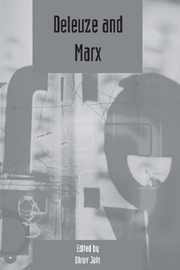Book contents
- Frontmatter
- Contents
- Editor's Introduction
- Articles
- Deleuze, Marx and the Politicisation of Philosophy
- The Marx of Anti-Oedipus
- Marx as Ally: Deleuze outside Marxism, Adjacent Marx
- The Fetish is Always Actual, Revolution is Always Virtual: From Noology to Noopolitics
- Minor Marxism: An Approach to a New Political Praxis
- Politicising Deleuzian Thought, or, Minority's Position within Marxism
- Review Essay
The Fetish is Always Actual, Revolution is Always Virtual: From Noology to Noopolitics
from Articles
Published online by Cambridge University Press: 12 September 2012
- Frontmatter
- Contents
- Editor's Introduction
- Articles
- Deleuze, Marx and the Politicisation of Philosophy
- The Marx of Anti-Oedipus
- Marx as Ally: Deleuze outside Marxism, Adjacent Marx
- The Fetish is Always Actual, Revolution is Always Virtual: From Noology to Noopolitics
- Minor Marxism: An Approach to a New Political Praxis
- Politicising Deleuzian Thought, or, Minority's Position within Marxism
- Review Essay
Summary
Abstract
By most accounts Deleuze's engagement with Marx begins with the two volumes of Capitalism and Schizophrenia he co-authored with Félix Guattari. However, Deleuze's Difference and Repetition alludes to a connection between Deleuze's critique of common sense and Marx's theory of fetishism, suggesting a connection between the critique of the image of thought and the critique of capital. By tracing this connection from its emergence in the early texts on noology, or the image of thought, to the development in the critique of state thought in A Thousand Plateaus, it can be argued that what initially appears as an entirely infra-philosophical problem, concerned with the presuppositions of philosophy, is not only a political problem as well, but ultimately bears on the very nature of the conjunction between thought and politics, making possible a re-examination of what is meant by revolutionary thought. It is a transition from noology to noopolitics. In the end it can be argued that revolutionary thought is no longer an eschatology, attempting to discern the signs of the future revolution in the present, but a thought oriented towards everything that exceeds the fetish of society, towards the virtual relations and micropolitical transformations that constitute society but exceed its representation.
Keywords: Commodity fetishism, ideology, labour, noology, virtual, and Actual
The obvious starting point for any discussion of the relation between Marx and Deleuze would seem to be the two volumes of Capitalism and Schizophrenia, in which Marx's texts provide the backdrop for the conceptualisation of deterritorialisation, desiring-production and abstract machines.
- Type
- Chapter
- Information
- Deleuze and MarxDeleuze Studies 2009 (Supplement), pp. 78 - 101Publisher: Edinburgh University PressPrint publication year: 2010



